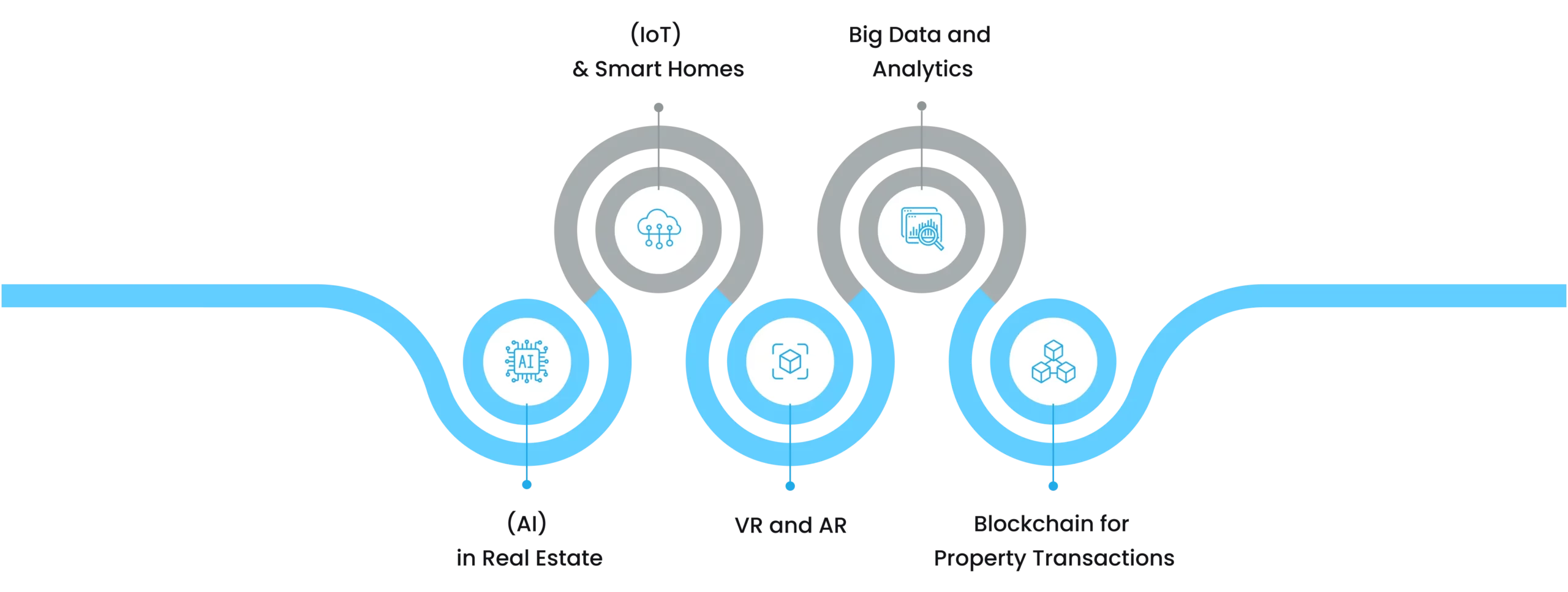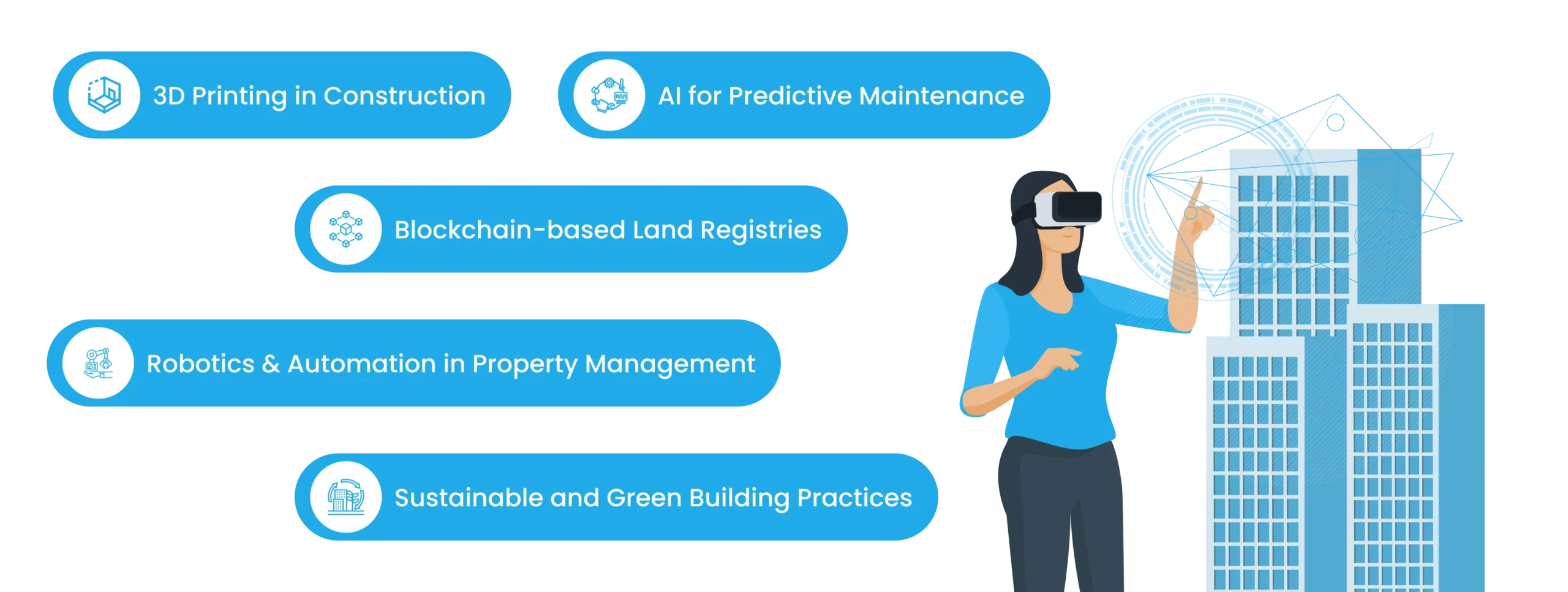

Are you ready to disrupt with AI? Join our Hackathon today! Click to Register
By WebOsmotic Team | Published on August 28, 2024
Summarize Article

Table of Contents
ToggleTechnology drives many industries, including real estate. As 2023 approaches, real estate companies must leverage technological advancements transforming the industry. By adopting innovative solutions, real estate professionals can enhance operations, improve customer experiences, and stay competitive. Real Estate Technology Trends are transforming the way properties are bought, sold, and managed in the modern world.
Technology has transformed real estate operations by revolutionizing property search, streamlining transactions, and enhancing data analysis. By utilizing technology, businesses can manage properties effectively, automate tasks, and provide seamless experiences to buyers, sellers, and investors. Moreover, through data-driven analytics and predictive modeling, technology equips professionals to make wise strategic decisions.
Proptech, or property technology, refers to the application of technology in the real estate industry. It encompasses a wide range of solutions like online listing platforms, property management software, smart home technology, virtual reality (VR) tours, and blockchain-based property transactions. Proptech solutions aim to improve efficiency, transparency, and accessibility in real estate processes. Implementing these technologies streamlines operations enhances communication, and delivers added value to clients.
Proptech has significantly reshaped real estate businesses by disrupting traditional approaches and introducing innovative practices. With the help of these solutions, it would be simpler for buyers to find suitable properties and for sellers to access a larger market. They also automate property management tasks, lowering administrative responsibilities and allowing professionals to concentrate on activities that generate value. Proptech has also improved transparency in transactions by providing accurate and up-to-date property information, transaction histories, and market trends.
Adopting proptech solutions offers numerous benefits for real estate businesses. Firstly, it improves operational efficiency by automating tasks like property listing, lead management, and document management, resulting in time savings and reduced errors. Secondly, proptech solutions enhance customer experiences by providing easy access to property information, virtual property tours, and online transaction capabilities. This leads to increased client satisfaction and higher chances of closing deals. Furthermore, proptech enables better data analysis, allowing professionals to gain valuable insights into market trends, customer preferences, and investment opportunities. By leveraging these insights, businesses can make more informed decisions and develop effective growth strategies.

Planning to develop a proptech app? Leverage our expertise.

With its numerous applications, artificial intelligence has become a game-changer in the real estate sector. Professionals may swiftly determine market worth by using automated property assessment powered by AI algorithms based on elements like location, size, and amenities. Predictive analytics powered by AI can assist spot market trends, empowering companies to make data-driven decisions and beat rivals.
Additionally, chatbots and virtual assistants powered by AI offer tailored customer recommendations, respond to questions, and expedite interactions to improve the entire customer experience.
With its numerous applications, artificial intelligence has become a game-changer in the real estate sector. Professionals may swiftly determine market worth by using automated property assessment powered by AI algorithms based on elements like location, size, and amenities. Predictive analytics powered by AI can assist spot market trends, empowering companies to make data-driven decisions and beat rivals.
Additionally, chatbots and virtual assistants powered by AI offer tailored customer recommendations, respond to questions, and expedite interactions to improve the entire customer experience.
Smart houses have undergone a transformation thanks to the Internet of Things, which allows owners to remotely manage and check on their properties. Smart door locks, lighting controls, security cameras, and thermostats are examples of IoT devices that offer convenience, improved security, and energy economy. Homeowners can adjust temperature settings, control lights, monitor cameras, and grant access to visitors, all from their smartphones. The integration of IoT technology into real estate properties offers a seamless and connected living experience.
Virtual reality and augmented reality technologies have transformed the property viewing experience. VR enables immersive virtual tours, providing a realistic sense of space, layout, and design. This is particularly useful for remote buyers or investors who can explore properties without physically visiting them. AR overlays virtual elements in the real world, allowing buyers to visualize how a property could look with different furniture or design choices. Both VR and AR enhance the property viewing experience, save time, and facilitate more informed decision-making.
The real estate industry generates vast amounts of data, including property listings, transaction histories, market trends, and customer preferences. Leveraging big data and advanced analytics tools, professionals can derive valuable insights. Analyzing historical and current market trends enables them to identify investment opportunities, predict property price movements, and assess demand-supply dynamics in specific locations. Additionally, big data analytics enables personalized marketing campaigns, tailored customer recommendations, and improved customer segmentation, leading to more effective targeting and increased satisfaction.
Blockchain technology has gained significant attention in real estate due to its potential to enhance transparency, security, and efficiency in property transactions. By using blockchain-based platforms, businesses can create tamper-proof and decentralized property records, reducing the risk of fraud and disputes. Blockchain-based smart contracts facilitate secure and automated transactions, eliminating the need for intermediaries and reducing costs and processing times. The transparent and immutable nature of blockchain records instills confidence in buyers and sellers, fostering trust in the real estate market.
3D printing technology holds immense potential in revolutionizing the construction industry. It enables rapid and cost-effective production of complex building components, reducing construction time and material waste. With 3D printing, customized and sustainable structures can be created, opening up new possibilities for architectural design and construction techniques. This technology addresses housing shortages, promotes affordable housing, and offers innovative and eco-friendly building solutions.
The use of artificial intelligence for predictive maintenance in real estate is expected to grow. By leveraging AI algorithms and machine learning, companies can analyze data from building sensors to predict maintenance needs and detect potential issues in advance. This proactive approach reduces costs and ensures optimal functioning of building systems, such as HVAC, electrical, and plumbing, improving operational efficiency and tenant satisfaction.
Blockchain technology is likely to disrupt traditional land registries by providing secure and immutable records of property ownership. By using blockchain, land registries can eliminate the risk of fraudulent transactions and disputes, as all property records are stored transparently and decentralized. This technology ensures accurate and reliable land ownership information, making property rights transfer more efficient, secure, and reliable.
The adoption of robotics and automation in property management is set to increase. Robotic automation handles routine property management tasks such as maintenance, cleaning, and security, reducing human error and improving efficiency. Robots equipped with AI and machine learning capabilities learn and adapt to specific property management requirements, enhancing tenant experiences and optimizing resource allocation.
The growing focus on sustainability and environmental responsibility will drive the adoption of energy-efficient technologies, renewable energy sources, and eco-friendly materials in real estate development. From solar panels and energy-efficient building materials to green roofs and rainwater harvesting systems, professionals will increasingly prioritize sustainable building practices. Embracing sustainable solutions benefits the environment, reduces costs, attracts eco-conscious buyers and tenants, and enhances the long-term value of properties.

In conclusion, the real estate industry is experiencing a digital transformation fueled by technology. By embracing and leveraging the tech trends reshaping the industry, real estate businesses can unlock numerous benefits, such as increased efficiency, improved customer experiences, and better decision-making. Staying informed about current and upcoming technologies and proactively adopting relevant solutions will position real estate professionals for success in 2023 and beyond.
Unlock exclusive insights and expert knowledge delivered straight to your inbox